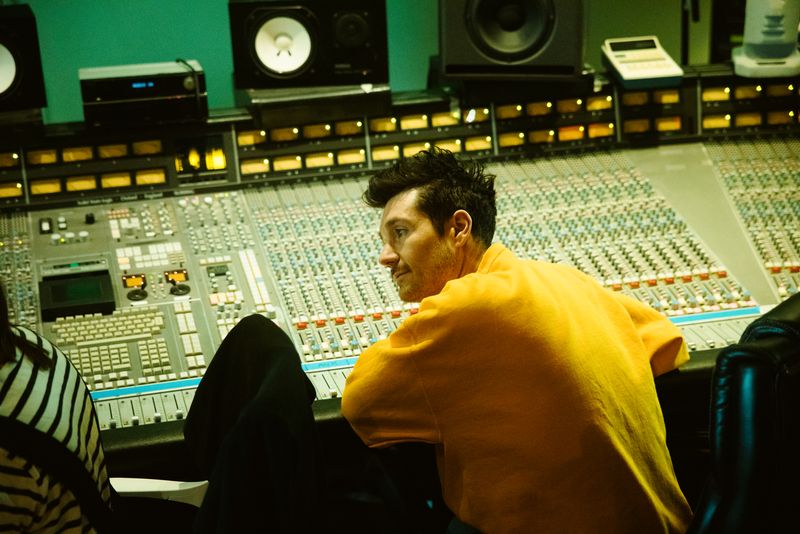Bastille’s Dan Smith tells us about new album ‘&’: “I wanted these songs to feel human”
As he gears up to release new album '&', Bastille's Dan Smith tells us about going it alone for his personal solo project.
By Nick Reilly

As Bastille‘s Dan Smith prepares to release his forthcoming project & (pronounced Ampersand), the singer has told Rolling Stone UK about delving into the lives of historical figures and satisfying a long-standing creative itch.
Back in the summer, the singer shared the first part of the project, which included the stirring ‘Intros & Narrators’ and a music video shot in the Bermuda Triangle, no less.
He’s since followed that song with the soaring‘Blue Sky & The Painter’, inspired by artist Edvard Munch’s battles with depression and ‘Leonard & Marianne’, which sees Smith examine the relationship between legendary singer Leonard Cohen and his lover Marianne Ihlen.
Speaking to Rolling Stone UK, Smith explained how he’d envisaged the project for a number of years, but only managed to begin work after finding himself with one of the longest periods of down time since Bastille began in 2010.
“I wanted to make something that was smaller sonically and just creatively fascinating for me. I’ve been wanting to make it for ages and when we finished touring at the end of last year, I came home and ended up going through these songs I’d created,” he explained. “I finally had the time to really think about the people behind them and explore their stories.”
Adding to this, he explained, was his friendship with the academic Emma Nagouse who hosts a companion podcast with Smith where they take an in-depth look at those featured within the songs.
“I’ve got the song ‘Bonnie and Clyde’ on there and they were a pair that existed in some way in the public eye, but, you know, also had fascinating lives, and they were kind of misunderstood in various different ways. It was super interesting for me to dig into them and try and find a perspective to write from.”
Explaining how he didn’t want the album to focus on 21st century figures, he added: “I wanted these songs to feel really human and I think one of the points of making them was taking these people who in some people’s eyes, exist in a kind of cartoonish, one dimensional way and trying to humanise them. I just thought it would be kind of interesting to make something that felt really organic and warm but also flawed and complicated.”
Opening up his role as the overarching narrator of the project, Smith also dismissed the idea that his own voice could potentially take away from the importance and significance of the stories told within – including that of Marie Curie’s work with radioactivity.
“I talk about that in the opening track ‘Intros and Narrators’ because I’m really fucking cynical and I’m probably my own harshest critic,” Smith said.
“As someone who exists in the world and lives online and loves music and film, there’s a weird thing in my head where I can feel hypocritical. But this project, and there’s something quite insane about it, was about returning to writing by myself, exploring these people and then chatting to other musicians and other writers.”
He added: “I was working on some music for a documentary a couple of years ago and was talking to them about this project and I guess I was questioning my position in it and wondering who am I to write about these people. They were really helpful in putting my fears at rest and just said if you approach it with respect, curiosity and generosity that’s the best you can do. It’s not an exploitative project, so that’s exactly what I’ve done.”
Elsewhere on the record, there’s a family side too. The folk-flecked ‘Telegraph Road 1977 &2024’ emerged after Smith wrote an early form of the song when he was a teenager and looked through a book of poetry and notes his father had acquired when travelling through the US in the 1970s.
The song was inspired by a poem of the same name which tackles homelessness in San Francisco, while the revisited version for this record also happens to feature the backing vocals of Smith’s mother.
“When my mum was at uni in South Africa she did folk gigs and she was an amazing folk singer. It helped her pay the bills. I wrote an early version of this song when I was a teenager and didn’t have anything to write about, so my dad gave me the poetry book that inspired it.
“I asked her to do backing vocals on it at the time because she was really the only musician I knew as a teenager. Cut to however many years later and I wanted to revisit that with my mum. We went to my parents’ house and took a recording booth with us because we wanted her to be as comfortable as possible. It was a song she hadn’t sung in quite a while, but it felt quite surreal to have my mum and dad involved.”
And looking forward, could Smith’s experiences on this project influence the future of Bastille when he regroups with the band for their next project?
“It could manifest itself in a whole number of ways. I just know I’ve had a really productive year and I have lots of ideas about what’s next with Bastille because I I love making those records. I think it’s always about trying to do something slightly different every time. I think it will be really exciting, but at the moment I’m just living in this exciting and incredibly fulfilling creative space.”
